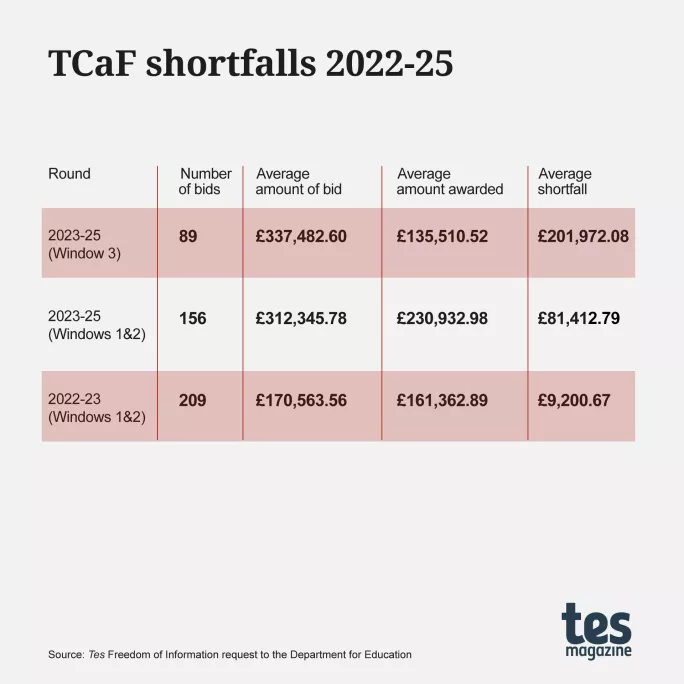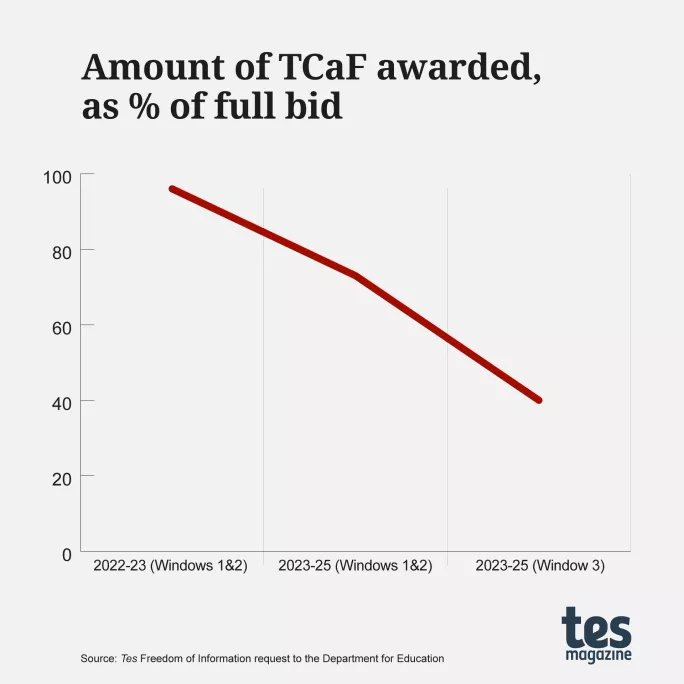Trust capacity grants fall £33m short of bids

Academy trusts are increasingly unlikely to get the funding they say their growth plans need, Tes analysis has found.
Despite a push from officials and ministers for trusts to grow, there has been a fall in the average amount handed out under the Trust Capacity Fund (TCaF).
The trend left every trust that applied to the latest round of TCaF with shortfalls of tens of thousands of pounds - stretching to £467,000 - between what they bid for and what they actually received.
Leaders say this limits their ability to support schools without raiding trust reserves and it is forcing them to “significantly scale back” growth plans.
TCaF funding shortfalls grow
The Department for Education describes TCaF as a grant “to help trusts develop their capacity to grow, helping schools, particularly underperforming schools in priority areas, to become part of those trusts”.
A guidance document from last year says the department “will back strong trusts that have the capacity for growth, especially those that accept the risks and challenges of supporting schools facing the most challenging circumstances”.
But information obtained by a Freedom of Information request to the DfE, and analysed by Tes, shows many trusts are not getting the TCaF funds they say they need to take on more schools - and the shortfall has grown over time.
The average gap between the amount of TCaF money trusts bid for and what they get has grown by 183 per cent between 2022-23 and the latest round of 2023-25 funding.
- MAT Tracker: Mapping the country’s multi-academy trusts
- Revealed: Where trust capacity funding goes
- Related: The fastest growing MATs
- Exclusive: 9 in 10 large MATs expect to grow by 2025
In 2022-23, on average, trusts applied for £170,563 and received 96 per cent of their bid amount.
This dipped to 73 per cent for the first two windows of funding that trusts could apply for in 2023-25 when the average bid grew to £312,345.
In the latest funding round for which data is available, trusts asked for £337,482 on average but got just 40 per cent of the money they applied for.
The combined shortfalls over the three rounds amount to £32.5 million.
The DfE said the department has committed up to £86 million in TCaF funding between 2022 and 2025. The data obtained by Tes shows allocations up to the third window of TCaF 2023-25 total nearly £82 million.


The DfE increased the maximum amount of money trusts could apply for in 2023-25 to £750,000 for those taking on at least five schools. However, no trust got close to that ceiling, Tes’ data reveals.
“The shortfall in funding limits us going further as a capacity bringer in the local area,” said Warren Carratt, CEO of Nexus MAT, which received £199,500 of the £500,000 it applied for.
He added: “The TCaF money should give you that extra capacity to do things you otherwise wouldn’t do: a lot of trusts would probably have to look at otherwise using trust reserves to be able to fund the growth and investment needed to meet the responsibilities of the schools they take on without grants, which is a challenge in such difficult times.”
The highest amount of funding received by a trust in the most recent application window went to the Bath and Wells Diocesan Academies Trust, which bid for £749,951 and received £524,965.
Some trusts saw even bigger shortfalls, of hundreds of thousands of pounds.
For example, Weaver Trust Limited, a trust of six primaries in the North West, got £200,000 after applying for £575,501.
Park Academies Trust, which runs a mix of secondaries and primaries in Swindon, got less than a third of the money it applied for, receiving £144,053 from a bid of £465,133.
‘A blow’ for smaller trusts
A CEO of a smaller academy trust set up in recent years told Tes that receiving just 40 per cent of the money it bid for was “quite a blow at such a formative stage in the trust’s development”.
The trust was hoping to use the TCaF money it was eligible for to expand its central team, to support quick growth in a short period of time. It had previously been successful in receiving nearly all of the money bid for in a previous round.
“We had to slightly increase our top slice to pick up some of the shortfall. We also had to significantly reduce that central team growth and significantly scale back our growth strategy,” said the CEO, who did not want to be named.
TCaF support was needed most by new and small trusts, they said.
Official government guidance for TCaF sets out that “where there are DfE budget constraints, it is likely that individual award amounts will be capped below the original amount in your application”.
How TCaF allocations can be used
Tes previously revealed that tight spending windows for TCaF meant some trust executives felt they had to almost “waste money” to avoid it being clawed back. The Confederation of School Trusts (CST) also previously said it would like to see more flexibility in how TCaF can be spent.
Coupled with the tight spending windows, the large shortfalls can make it difficult for trusts to use the money as flexibly as they would like, one large trust CEO who wanted to remain anonymous told Tes.
When trusts apply for TCaF, they have to set out what they will use the grant for. For example, the CEO’s bid included funding to create six new roles that would support the trust’s growth.
The CEO said he asked for around £300,000 to create six new jobs, with a £50,000 salary each, but the DfE awarded a third of this amount across the six jobs.
“They might as well just say I’ve been unsuccessful as I can’t put the other two-thirds in anyway. And then we don’t get to claim that money,” they said.
Funding to ‘get off the ground flying’
King’s Group Academies, which has 14 schools across Hampshire, Bracknell Forest and Portsmouth, was £467,158 short on its bid, receiving just £100,000.
This was the biggest shortfall for the latest round of TCaF funding, but the trust’s deputy CEO Sue Collins said the trust had been advised by the DfE to bid for everything it needed - even though it was only eligible for up to £250,000.
“Getting all of that money would have enabled us to get off the ground flying as take on new schools,” Ms Collins told Tes.
“We will still be able to do the things we need to - they will just happen a bit slower as we need to pace it sensibly according to our budget,” she said. The trust’s priorities are to increase the capacity of its central team and recruit for specific roles.
Transparency of TCaF decisions
Tom Legge, director of consultancy Premier Advisory, which helps trusts prepare TCaF bids, told Tes: “This is the first window that we’ve seen TCaF take a significant haircut.
“That could be to do with the rise in the maximum amount - the funding will run out much quicker if some trusts are getting much bigger allocations.”
Mr Legge said trusts can usually move 5 per cent of the funding approved for each item bid to spend on different priorities.
“We have generally seen quite blanket deductions, but there is some flexibility,” he said. He urged trusts left unable to recruit due to the amount of TCaF allocated “to go back to the DfE and explain the situation”.
Trust CEOs told Tes the decision making on funding amounts feels “random”, with little feedback on bids.
‘No feedback or explanation’
Mr Carratt said: “There is an utter absence of transparency in the decision making in the grant allocation.
“There was no feedback or explanation for why we were only given that partial award and the nature of what we bid for is consistent with where we’ve been successful in receiving grant funding in the past.”
Nexus was bidding for TCaF to take on an inadequate school in Nottingham - an Education Investment Area - and for another school in Sheffield.
Mr Carratt added: “In my opinion, it’s clear that the latest round of TCaF is moving towards larger trusts acquiring smaller trusts.
“If TCaF is about helping smaller and medium-sized trusts grow to be able to meet the needs of the government in terms of academy growth, it’s not that.
“There needs to be greater alignment between the department’s strategic vision and allocation of resource that is clearer on what the department wants on trusts’ size and how they intend to deliver it.”
Trusts have also previously told Tes they would like to see more transparency in growth decisions made by regional directors.
Trust capacity funding ‘essential’
CST deputy chief executive Steve Rollett said trust capacity funding “should not be piecemeal but rather a strategic and sustained approach to building capacity over multiple years”.
“We fully acknowledge the fiscal constraints that the government faces, but sustained investment in our school system is essential for our future prosperity,” he added.
The DfE and all MATs named were contacted for comment.
For the latest education news and analysis delivered directly to your inbox every weekday morning, sign up to the Tes Daily newsletter
You need a Tes subscription to read this article
Subscribe now to read this article and get other subscriber-only content:
- Unlimited access to all Tes magazine content
- Exclusive subscriber-only stories
- Award-winning email newsletters
Already a subscriber? Log in
You need a subscription to read this article
Subscribe now to read this article and get other subscriber-only content, including:
- Unlimited access to all Tes magazine content
- Exclusive subscriber-only stories
- Award-winning email newsletters
topics in this article



